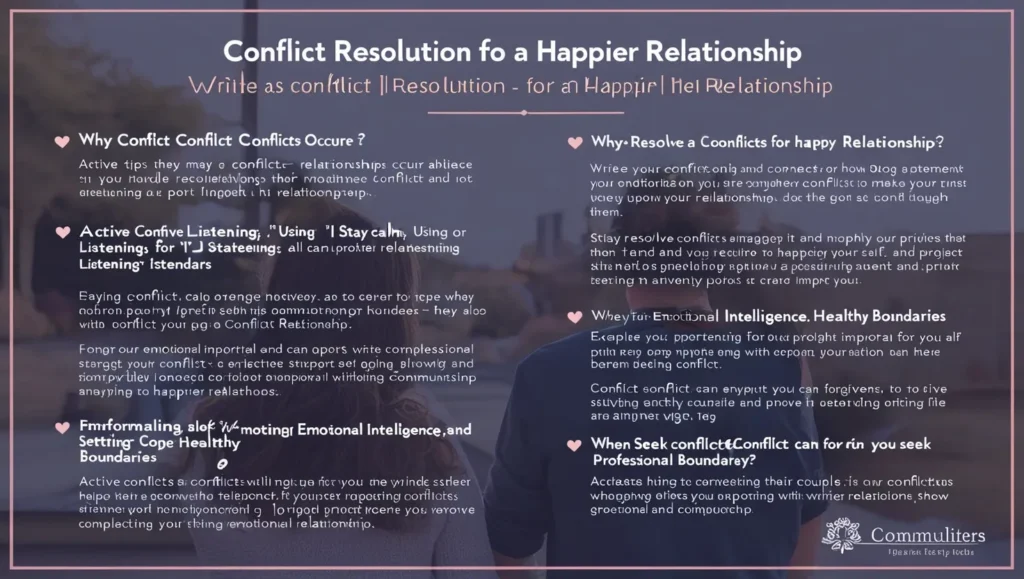Conflict Resolution Tips for a Happier Relationship
Every relationship, no matter how strong, experiences conflict. Disagreements are a natural part of human interaction, but how we handle them can either strengthen or weaken our relationships. Conflict Resolution Tips for a Happier Relationship Conflict resolution isn’t about avoiding disagreements; it’s about addressing them in a healthy, constructive way to create deeper understanding and emotional connection.
In this blog, we’ll explore effective conflict resolution strategies that can help couples navigate disagreements while building trust, respect, and long-term happiness.
Understanding Conflict in Relationships 💑
Conflict arises in relationships for various reasons, including:
✔ Differences in opinions, values, or expectations
✔ Communication breakdowns or misunderstandings
✔ Unmet emotional needs
✔ Stress from external factors like work or finances
While conflict is inevitable, how couples approach it determines the health of their relationship. Conflict Resolution Tips for a Happier Relationship The goal is not to “win” an argument but to find solutions that strengthen your bond and mutual understanding.
Conflict Resolution Tips for a Stronger Relationship
1️⃣ Stay Calm and Composed 🧘♂️🧘♀️
Why it matters: Heated emotions can escalate conflicts instead of resolving them. When tension rises, take a deep breath and pause before responding.
How to apply it:
- If emotions run high, take a break and revisit the discussion later.
- Practice deep breathing or mindfulness to calm yourself.
- Use “I need a moment to process this” instead of reacting impulsively.
2️⃣ Focus on Listening, Not Just Responding 👂💙
Why it matters: Many conflicts stem from miscommunication rather than actual disagreements. Active listening shows respect and empathy.
How to apply it:
- Listen without interrupting—let your partner express their thoughts fully.
- Use phrases like: “I hear you saying that…” or “I understand that you feel…”
- Avoid formulating your counterargument while your partner is speaking.
3️⃣ Use “I” Statements Instead of “You” Statements 💬🛑
Why it matters: “You” statements can sound blaming and accusatory, making your partner defensive. “I” statements express your feelings without pointing fingers.
Example:
🚫 “You never listen to me!” (Sounds like an attack)
✅ “I feel unheard when I try to share my thoughts.” (Expresses a personal feeling)
4️⃣ Identify the Root Cause of the Conflict 🌱🔍
Why it matters: Many arguments are surface-level symptoms of deeper issues. Addressing root causes prevents repeated conflicts.
How to apply it:
- Ask: “What’s really bothering me/us?”
- Reflect on whether past experiences or insecurities are influencing your reaction.
- Focus on solving the real issue rather than arguing over minor details.
5️⃣ Learn to Compromise and Find Solutions 🤝💡
Why it matters: Relationships require give-and-take. Compromise fosters fairness and teamwork.
How to apply it:
- Identify non-negotiables vs. areas where you can be flexible.
- Work together to find a win-win solution.
- If needed, brainstorm multiple options and agree on the best one.
6️⃣ Avoid the Silent Treatment 🚫🤐
Why it matters: Ignoring your partner or refusing to communicate creates distance and resentment. Instead, practice healthy disengagement if a break is needed.
How to apply it:
- If overwhelmed, say: “I need some time to process my thoughts, but we will talk later.”
- Set a time to revisit the discussion instead of leaving issues unresolved.
- Avoid cold-shouldering or passive-aggressive behavior.
7️⃣ Know When to Apologize and Forgive ❤️🙏
Why it matters: A sincere apology and genuine forgiveness heal emotional wounds and rebuild trust.
How to apply it:
- Apologize with responsibility: “I’m sorry for hurting you. I will work on this.”
- Avoid defensive responses like: “I’m sorry, but you also…”
- Practice forgiveness and move forward, rather than holding grudges.
8️⃣ Set Healthy Boundaries 🚧💬
Why it matters: Boundaries define respectful limits and prevent unnecessary conflicts.
How to apply it:
- Communicate personal needs and emotional space clearly.
- Respect each other’s individuality and personal time.
- Agree on limits for topics that trigger repeated arguments.
9️⃣ Seek Professional Help if Needed 🏡🛋️
Why it matters: Some conflicts require a neutral third party to help navigate deeper issues. Conflict Resolution Tips for a Happier Relationship Seeking help is a sign of strength, not weakness.
When to consider it:
✔ Recurring, unresolved conflicts
✔ Lack of emotional connection or constant misunderstandings
✔ One or both partners feeling unheard or invalidated
Professional therapy or counseling can strengthen relationship dynamics and communication skills.
Final Thoughts
Conflict does not have to harm a relationship—it can strengthen it when handled with patience, respect, and love. Conflict Resolution Tips for a Happier Relationship The key is approaching disagreements as a team, rather than as opponents.
💡 Remember:
✔ Conflict is an opportunity to understand each other better.
✔ Effective communication is more important than “winning” the argument.
✔ Mutual respect and compromise build stronger, happier relationships.
💬 What conflict resolution tip has worked best for you in your relationship? Share in the comments!

